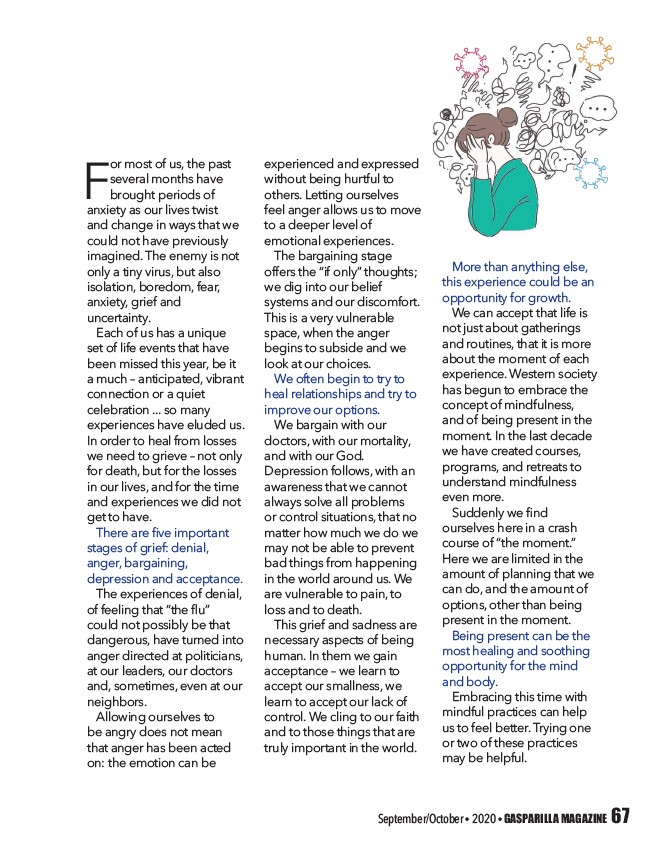
September/October • 2020 • GASPARILLA MAGAZINE 67
For most of us, the past
several months have
brought periods of
anxiety as our lives twist
and change in ways that we
could not have previously
imagined. The enemy is not
only a tiny virus, but also
isolation, boredom, fear,
anxiety, grief and
uncertainty.
Each of us has a unique
set of life events that have
been missed this year, be it
a much – anticipated, vibrant
connection or a quiet
celebration ... so many
experiences have eluded us.
In order to heal from losses
we need to grieve – not only
for death, but for the losses
in our lives, and for the time
and experiences we did not
get to have.
There are fi ve important
stages of grief: denial,
anger, bargaining,
depression and acceptance.
The experiences of denial,
of feeling that “the fl u”
could not possibly be that
dangerous, have turned into
anger directed at politicians,
at our leaders, our doctors
and, sometimes, even at our
neighbors.
Allowing ourselves to
be angry does not mean
that anger has been acted
on: the emotion can be
experienced and expressed
without being hurtful to
others. Letting ourselves
feel anger allows us to move
to a deeper level of
emotional experiences.
The bargaining stage
offers the “if only” thoughts;
we dig into our belief
systems and our discomfort.
This is a very vulnerable
space, when the anger
begins to subside and we
look at our choices.
We often begin to try to
heal relationships and try to
improve our options.
We bargain with our
doctors, with our mortality,
and with our God.
Depression follows, with an
awareness that we cannot
always solve all problems
or control situations, that no
matter how much we do we
may not be able to prevent
bad things from happening
in the world around us. We
are vulnerable to pain, to
loss and to death.
This grief and sadness are
necessary aspects of being
human. In them we gain
acceptance – we learn to
accept our smallness, we
learn to accept our lack of
control. We cling to our faith
and to those things that are
truly important in the world.
More than anything else,
this experience could be an
opportunity for growth.
We can accept that life is
not just about gatherings
and routines, that it is more
about the moment of each
experience. Western society
has begun to embrace the
concept of mindfulness,
and of being present in the
moment. In the last decade
we have created courses,
programs, and retreats to
understand mindfulness
even more.
Suddenly we fi nd
ourselves here in a crash
course of “the moment.”
Here we are limited in the
amount of planning that we
can do, and the amount of
options, other than being
present in the moment.
Being present can be the
most healing and soothing
opportunity for the mind
and body.
Embracing this time with
mindful practices can help
us to feel better. Trying one
or two of these practices
may be helpful.